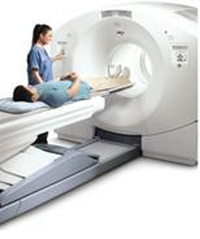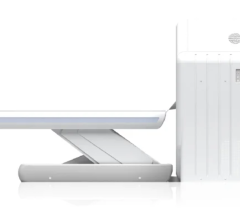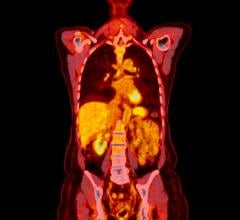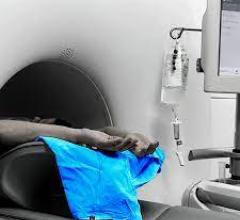
June 8, 2011 — GE Healthcare announced the release of its Optima PET/CT 560, which offers efficiency and investment protection with the capability to grow with the future needs of a clinical practice.
From the uninterrupted full head-to-toe exam to the dose reduction features, the Optima PET/CT 560 was designed to help physicians put patients’ needs first. The Optima PET/CT 560 enables a full 2-meter scan range, which is especially important when imaging skin and bone.
Clinicians can complete a full head-to-toe scan in one pass for greater patient comfort and convenience, and position taller patients on the table with greater ease, thus saving up to 15 minutes per exam by eliminating patient repositioning and potentially boosting scanning efficiency and patient throughput.
Advanced GE Vue Point HD intelligent 3-D iterative reconstruction technique enhances resolution for image quality that helps enable clinicians to confidently detect small lesions and increase quantitative accuracy.
Based on the Broselow-Luten Pediatric system, GE Healthcare’s default PET/CT protocols are specifically designed to help reduce computed tomography (CT) radiation exposure in FDG pediatric exams to meet ALARA (as low as reasonably achievable) guidelines. With a GE-developed interface dedicated to pediatric examinations, physicians select from color-coded protocols set in advance to suit a child’s specific weight.
In addition, the Optima PET/CT 560 uses a 3-D modulation algorithm, which automatically adjusts the mA as clinicians scan along the X-Y-Z axes. The modulation maintains CT image quality, yet dose is reduced up to 40 percent.
The Optima PET/CT 560 is built for growth; the system is fully upgradeable to the GE Healthcare Discovery PET/CT 600 series as department needs grow and change. Available in 8-slice or 16-slice configurations, the Optima PET/CT 560 can be operated as a standalone CT scanner.
The user interface is simplified for fast exam setup, and the compact and ergonomic operator console is designed for flexibility and comfort. Starting with pre-scan and through to post-processing, the Optima PET/CT 560 can help make the entire scanning experience streamlined and efficient. Daily Quality Assurance at the start of the scanning day is quick and efficient with one-button push and less than 10 minutes a day, with no additional exposure to the staff with the GE automated source loader. Fast reconstruction times deliver images to clinicians sooner, allowing decision-making before a patient is even off the table.
For more information: www.gehealthcare.com


 November 17, 2025
November 17, 2025 








![Phase III clinical trial of [18F]flurpiridaz PET diagnostic radiopharmaceutical meets co-primary endpoints for detecting Coronary Artery Disease (CAD)](/sites/default/files/styles/content_feed_medium/public/Screen%20Shot%202022-09-13%20at%203.30.13%20PM.png?itok=2w6OoNd6)
